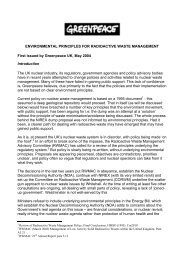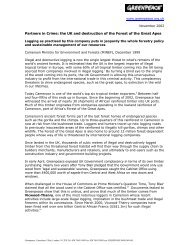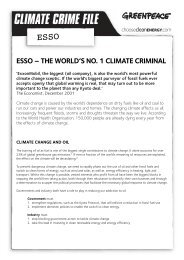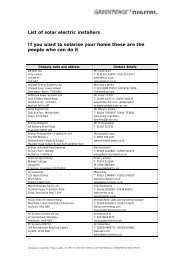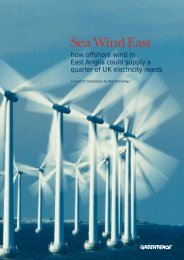Connecting the Future - Greenpeace UK
Connecting the Future - Greenpeace UK
Connecting the Future - Greenpeace UK
Create successful ePaper yourself
Turn your PDF publications into a flip-book with our unique Google optimized e-Paper software.
<strong>Connecting</strong> <strong>the</strong> future: <strong>the</strong> <strong>UK</strong>’s renewable energy strategy<br />
Energy systems<br />
13<br />
renewable heat projects in <strong>the</strong> residential sector, and small and medium sized<br />
businesses have been eligible for grants and loans under <strong>the</strong> Market Stimulation<br />
Programme (Marktanreizprogramm, or MAP). The renewable heat sector<br />
expanded from 3.5% in 1998 to 6.6% in 2007 (BMU 2008a).<br />
16<br />
14<br />
Electricity production<br />
(% of total gross<br />
electricity consumption)<br />
12<br />
10<br />
Heating supply (% of<br />
total heating supply)<br />
%<br />
8<br />
6<br />
Fuel consumption (% of<br />
total road transport)<br />
4<br />
2<br />
Share of RES in total final<br />
energy consumption<br />
0<br />
1998 1999 2000 2001 2002 2003 2004 2005 2006 2007<br />
Figure 1.1 Renewable energy share of energy consumption in Germany.<br />
Source BMU (2008a)<br />
In 1998, renewable energy provided 3.1% of total final energy consumption<br />
in Germany. By 2007, this had risen to 8.5% (Figure 1.1), and <strong>the</strong> German<br />
government has recently announced ambitious plans for fur<strong>the</strong>r expansion<br />
to 2020: 25-30% of electricity consumption, 14% of heat consumption and<br />
6.9% of transport fuel consumption (BMU 2007b). The rationale behind <strong>the</strong>se<br />
plans is partly to reduce CO2 emissions, but is also aimed at driving innovation<br />
and expanding Germany’s role in <strong>the</strong> international market for renewable energy<br />
technologies.<br />
1.1.2 Spain<br />
As with Germany, Spain has developed renewable energy policies shaped both<br />
by environmental concerns and industrial ambition. It has a target of 12.1%<br />
renewable energy by 2010, with renewable electricity supplying 30.3% of<br />
consumption. These are both challenging targets, and it appears unlikely that<br />
<strong>the</strong>y will be met: renewables supplied 18.8% of electricity consumption in<br />
2006, and 6.8% of primary energy (EREC 2008).<br />
The likely failure to meet <strong>the</strong> 2010 targets, however, does not mean that<br />
<strong>the</strong> expansion of renewables in Spain in recent years is not impressive. The<br />
wind sector in particular has grown significantly, from 2,235MW of installed<br />
3 <br />
This has led to a revision to <strong>the</strong><br />
tariff offered under <strong>the</strong> feed-in<br />
arrangements, which in turn is<br />
expected to slow future growth in<br />
<strong>the</strong> sector slightly.


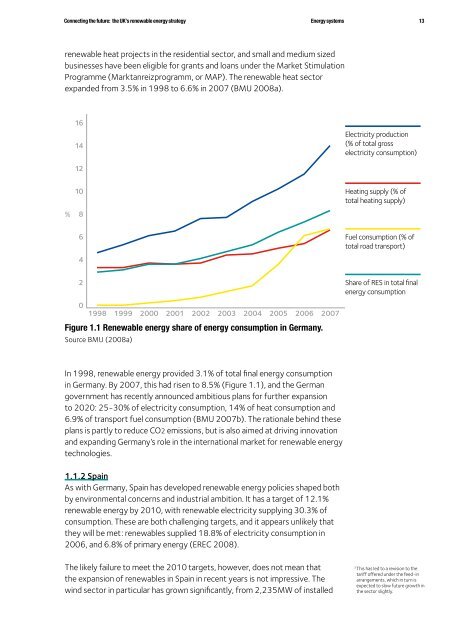
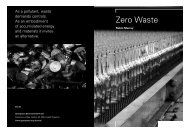
![[2007] EWHC 311 - Greenpeace UK](https://img.yumpu.com/22079793/1/184x260/2007-ewhc-311-greenpeace-uk.jpg?quality=85)

